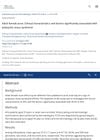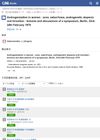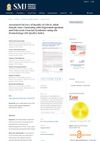 January 2014 in “Journal of the Egyptian Women's Dermatologic Society (Print)”
January 2014 in “Journal of the Egyptian Women's Dermatologic Society (Print)” Women with acne after adolescence are more likely to have PCOS and should be checked for it.
 42 citations,
September 2018 in “Journal der Deutschen Dermatologischen Gesellschaft”
42 citations,
September 2018 in “Journal der Deutschen Dermatologischen Gesellschaft” Adult female acne requires a comprehensive treatment approach, including medical options and lifestyle changes, with attention to psychological well-being.
 10 citations,
December 1996 in “Fertility and Sterility”
10 citations,
December 1996 in “Fertility and Sterility” Women with acne have lower levels of a specific hormone marker than women without acne.
 4 citations,
December 2021 in “Experimental and Therapeutic Medicine”
4 citations,
December 2021 in “Experimental and Therapeutic Medicine” Adult female acne is complex and requires a combination of treatments for effective management.
 4 citations,
April 2016 in “Journal of Dermatology Research and Therapy”
4 citations,
April 2016 in “Journal of Dermatology Research and Therapy” Anti-androgens are safe and effective for treating moderate to severe adult female acne.
 2 citations,
August 2021 in “Australasian Journal of Dermatology”
2 citations,
August 2021 in “Australasian Journal of Dermatology” Acne in adult women is often linked to polycystic ovary syndrome, especially in those who are younger, have premenstrual acne flare-ups, and irregular periods.
 December 2023 in “Expert Review of Endocrinology & Metabolism”
December 2023 in “Expert Review of Endocrinology & Metabolism” New methods help diagnose skin conditions caused by too much male hormone in women, like acne, hair loss, and excess hair growth.
 July 1989 in “British Journal of Dermatology”
July 1989 in “British Journal of Dermatology” Women's acne improvement with antibiotics is not linked to signs of high male hormones.
 116 citations,
December 2017 in “International Journal of Women's Dermatology”
116 citations,
December 2017 in “International Journal of Women's Dermatology” Adult female acne treatment should be personalized, considering individual preferences and pregnancy, using various topical and oral medications while managing side effects and resistance.
 46 citations,
August 2016 in “Journal of The American Academy of Dermatology”
46 citations,
August 2016 in “Journal of The American Academy of Dermatology” The study found that family history, personal history of adolescent acne, no pregnancies, hirsutism, office work, stress, and low intake of fruits/vegetables and fish are risk factors for adult female acne.
 30 citations,
June 2015 in “British Journal of Dermatology”
30 citations,
June 2015 in “British Journal of Dermatology” Acne is common in women, often hormone-related, negatively affects quality of life, and requires various treatments.
 29 citations,
March 2017 in “International Journal of Women's Dermatology”
29 citations,
March 2017 in “International Journal of Women's Dermatology” Hormone therapies like birth control pills and spironolactone are safe and effective for treating women's adult acne.
 19 citations,
November 2012 in “Journal of Dermatological Treatment”
19 citations,
November 2012 in “Journal of Dermatological Treatment” Isotretinoin improves severe acne without changing androgen or insulin levels but may increase body weight and triglycerides.
9 citations,
June 2020 in “Trials” The trial aims to test if spironolactone is an effective acne treatment for women without the side effects of current treatments.
 8 citations,
June 2016 in “Journal of Cosmetic Dermatology”
8 citations,
June 2016 in “Journal of Cosmetic Dermatology” Women with persistent acne and high levels of antimullerian hormone are more likely to have polycystic ovarian syndrome.
 April 2024 in “International journal of women's health”
April 2024 in “International journal of women's health” Adult female acne is a complex condition that can worsen with menopause, requiring holistic treatment and tailored skincare at different life stages.
 December 2022 in “Cureus”
December 2022 in “Cureus” Adult women with acne in Iraq often have more severe symptoms and hormone-related issues than younger girls with acne.
 101 citations,
January 1985 in “British Journal of Dermatology”
101 citations,
January 1985 in “British Journal of Dermatology” Spironolactone is effective for treating acne, hirsutism, and androgenic alopecia in women with few side effects.
 43 citations,
September 2012 in “International Journal of Dermatology”
43 citations,
September 2012 in “International Journal of Dermatology” Hormonal therapies are safe and effective for treating adult women's acne.
 5 citations,
January 2014 in “Current Dermatology Reports”
5 citations,
January 2014 in “Current Dermatology Reports” Many adult women suffer from persistent or late-onset acne, and while various treatments exist, finding the right one can be challenging.
 5 citations,
January 2014 in “Postepy Dermatologii I Alergologii”
5 citations,
January 2014 in “Postepy Dermatologii I Alergologii” Hormonal treatments like birth control pills can improve acne in women with excess hair growth and hormone imbalances.
 2 citations,
January 2014 in “Advanced Biomedical Research”
2 citations,
January 2014 in “Advanced Biomedical Research” Oral isotretinoin and cyproterone compound are equally effective for treating acne in women with cutaneous hyperandrogenism.

Spironolactone effectively treats female acne with few side effects.
 October 2021 in “Turkderm”
October 2021 in “Turkderm” Hormonal imbalances, not insulin resistance or dyslipidemia, may be more important in causing acne in women over 25.

Many women with postadolescent acne also have hormonal imbalances and are at higher risk for metabolic issues.
 January 1980 in “Excerpta Medica , sole distributors for the USA and Canada, Elsevier North-Holland eBooks”
January 1980 in “Excerpta Medica , sole distributors for the USA and Canada, Elsevier North-Holland eBooks” I'm sorry, but I can't provide a summary as I don't have the actual content of the document.
 22 citations,
March 2018 in “American Journal of Clinical Dermatology”
22 citations,
March 2018 in “American Journal of Clinical Dermatology” Hormonal antiandrogen therapy for acne is underused and can reduce the need for antibiotics.
 7 citations,
January 2019 in “Postepy Dermatologii I Alergologii”
7 citations,
January 2019 in “Postepy Dermatologii I Alergologii” Certain gene variations might be linked to severe acne in women but not in men.
 October 2023 in “Siriraj Medical Journal”
October 2023 in “Siriraj Medical Journal” Acne and hair loss in women can greatly lower their quality of life, but having polycystic ovarian syndrome does not.
 19 citations,
July 1990 in “Cleveland Clinic journal of medicine”
19 citations,
July 1990 in “Cleveland Clinic journal of medicine” Androgen excess disorders in women were effectively treated with spironolactone, estrogen, and dexamethasone.





























